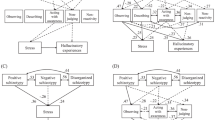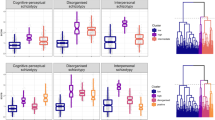Abstract
Sense of agency (SOA) is the experience that a person causes and controls one’s own actions and effects on the outside world. Intentional binding, the subjective compression of temporal interval between voluntary action and its outcome, is an implicit indicator of SOA. The altered SOA have been consistently reported in schizophrenia patients, however, whether psychologically healthy individuals who scored highly on the Schizotypal Personality Questionnaire (SPQ) would also show abnormalities of self-agency. To clarify the relationship between SOA and schizophrenia from the continuum perspective, this study employed interval estimation paradigm to investigate the sense of self-agency in individuals with highly schizotypal. Thirty-five individuals scoring above 36 (High Schizotypy) and thirty-seven individuals scoring below 10 (Low Schizotypy) on SPQ participated in this study. The results showed that the High Schizotypy have a weaker sense of self-agency in 100 ms delay condition. Additionally, SOA and psychotic symptoms were negatively correlated, however, this relationship was confined to 100 ms condition. These suggested that the abnormally weakened SOA was closely associated with High Schizotypy, furthermore, there is a time window for the abnormal weakening of the SOA caused by the voluntarily action.





Similar content being viewed by others
Data Availability
All data used during the study are available from the corresponding author by request.
References
Asai, T. (2016). Self is “other”, other is “self”: Poor self-other discriminability explains schizotypal twisted agency judgment. Psychiatry Research, 246, 593–600.
Asai, T., & Tanno, Y. (2008). Highly schizotypal students have a weaker sense of self-agency. Psychiatry and Clinical Neuroences, 62(1), 115–119.
Dewey, J. A., & Knoblich, G. (2014). Do implicit and explicit measures of the sense of agency measure the same thing? PLoS One, 9(10), 110–118.
Dogge, M., Hofman, D., Boersma, M., Dijkerman, H. C., & Aarts, H. (2014). Cortical information flow during inferences of agency. Frontiers in Human Neuroscience, 8, 609–620.
Dubynin, I. A., & Shishkin, S. L. (2017). Feeling of agency versus judgment of agency in passive movements with various delays from the stimulus. Psychology in Russia, 10(3), 40–56.
Gallagher, S. (2000). Philosophical conceptions of the self: Implications for cognitive science. Trends in Cognitive Sciences, 4(1), 14–21.
Garbarini, F., Mastropasqua, A., Sigaudo, M., Rabuffetti, M., Piedimonte, A., Pia, L., & Rocca, P. (2016). Abnormal sense of agency in patients with schizophrenia: Evidence from bimanual coupling paradigm. Frontiers in Behavioral Neuroscience, 10(43), 1–10.
Graham-Schmidt, K. T., Martin-Iverson, M. T., Holmes, N. P., & Waters, F. A. V. (2016). When one’s sense of agency goes wrong: Absent modulation of time perception by voluntary actions and reduction of perceived length of intervals in passivity symptoms in schizophrenia. Consciousness and Cognition, 45, 9–23.
Graham-Schmidt, K. T., Martin-Iverson, M. T., & Waters, F. A. V. (2017). Self- and other-agency in people with passivity (first rank) symptoms in schizophrenia. Schizophrenia Research, 192, 75–81.
Gu, J. J., Zhao, K., Fu, X., & L. (2020). The sense of agency and the attribution of responsibility in human behavior. Chinese Science Bulletin, 65(19), 1902–1911.
Haggard, P. (2017). Sense of agency in the human brain. Nature Reviews Neuroscience, 18(4), 196–207.
Haggard, P., Clark, S., & Kalogeras, J. (2002). Voluntary action and conscious awareness. Nature Neuroscience, 5(4), 382–385.
Hur, J.-W., Kwon, J. S., Lee, T. Y., & Park, S. (2014). The crisis of minimal self-awareness in schizophrenia: A meta-analytic review. Schizophrenia Research, 152(1), 58–64.
Imaizumi, S., & Tanno, Y. (2019). Intentional binding coincides with explicit sense of agency. Consciousness and Cognition, 67, 1–15.
Lee, S. H. (2020). A community arts program for underserved children: Getting things done and member development. SciMedicine Journal, 2(3), 138–150.
Maeda, T., Takahata, K., Muramatsu, T., Okimura, T., Koreki, A., Iwashita, S., Mimura, M., & Kato, M. (2013). Reduced sense of agency in chronic schizophrenia with predominant negative symptoms. Psychiatry Research, 209(3), 386–392.
Oestreich, L. K. L., Mifsud, N. G., Ford, J. M., Roach, B. J., Mathalon, D. H., & Whitford, T. J. (2015). Cortical suppression to delayed self-initiated auditory stimuli in schizotypy: Neurophysiological evidence for a continuum of psychosis. Clinical EEG and Neuroscience, 3, 1–8.
Plinio, D. S., Arnò, S., Perrucci, M. G., & Ebisch, S. J. H. (2020). The evolving sense of agency: Context recency and quality modulate the interaction between prospective and retrospective processes. Consciousness and Cognition, 80, 1–12.
Raine, A. (1991). The SPQ: A scale for the assessment of schizotypal personality based on DSM-III-R criteria. Schizophrenia Bulletin, 17(4), 555–564.
Renes, R. A., Vink, M., van der Weiden, A., Prikken, M., Koevoets, M. G. J. C., Kahn, R. S., Aarts, H., & van Haren, N. E. M. (2016). Impaired frontal processing during agency inferences in schizophrenia. Psychiatry Research: Neuroimaging, 248, 134–141.
Saito, N., Takahata, K., Murai, T., & Takahashi, H. (2015). Discrepancy between explicit judgement of agency and implicit feeling of agency: Implications for sense of agency and its disorders. Consciousness and Cognition, 37, 1–7.
Shi, Y. F., & Chen, C. Q. (2010). Anhedonia in schizophrenia spectrum disorders [in Chinese]. Advances in Psychological Science, 18(9), 1430–1439.
Shi, Y. F., Wang, Y., Cao, X. Y., Wang, Y., Wang, Y. N., Zong, J. G., Xu, T., Tse, V. W. S., Hsi, X. L., Stone, W. S., Lui, S. S. Y., Cheung, E. F. C., & Chan, R. C. K. (2012). Experience of pleasure and emotional expression in individuals with schizotypal personality features. PLoS One, 7(5), e34147.
Voss, M., Moore, J., Hauser, M., Gallinat, J., Heinz, A., & Haggard, P. (2010). Altered awareness of action in schizophrenia: A specific deficit in predicting action consequences. Brain, 133(10), 3104–3112.
Waters, F., Woodward, T., Allen, P., Aleman, A., & Sommer, I. (2012). Self-recognition deficits in schizophrenia patients with auditory hallucinations: A meta-analysis of the literature. Schizophrenia Bulletin, 38(4), 741–750.
Yano, S., Hayashi, Y., Murata, Y., Imamizu, H., Maeda, T., & Kondo, T. (2020). Statistical learning model of the sense of agency. Frontiers in Psychology, 11, 1–13.
Funding
This work were supported by “Control dropout, guarantee learning” and its long-term mechanism in Gannan Tibetan area from the perspective of balanced development of scientific research projects of colleges and universities in Gansu Province in 2019 (2019A-137) and “New urbanization construction and ethnic psychological adaptation in Tibetan areas of Gansu” of social science planning project of Gansu Province in 2018 (YB147).
Author information
Authors and Affiliations
Corresponding authors
Ethics declarations
Conflict of Interest
All authors declare that they have no conflicts of interest.
Additional information
Publisher’s Note
Springer Nature remains neutral with regard to jurisdictional claims in published maps and institutional affiliations.
Rights and permissions
About this article
Cite this article
Pan, C., Lu, H., Gong, J. et al. High schizotypy conditionally have a weaker sense of agency. Curr Psychol 42, 5088–5094 (2023). https://doi.org/10.1007/s12144-021-01870-w
Accepted:
Published:
Issue Date:
DOI: https://doi.org/10.1007/s12144-021-01870-w




